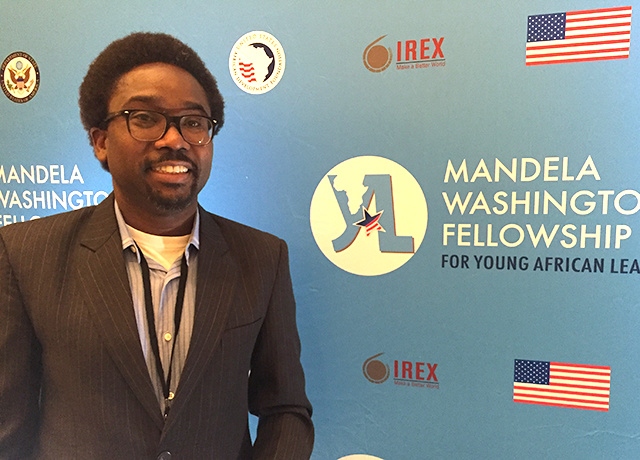By Tom Snee, Iowa Now
The University of Iowa will host 25 young business and government leaders from several African countries this summer as part of the U.S. State Department’s Mandela Washington Fellowship for African Leaders.
The fellows will spend six weeks in Iowa, participating in entrepreneurial education programs on the UI campus in Iowa City and also touring the state, visiting businesses in Des Moines, Muscatine, the Quad Cities, Cedar Rapids, and other cities. Dimy Doresca, director of the UI Institute for International Business, says the fellows will learn more about the American economy and how American businesses are managed, information they can bring home to help build and strengthen businesses in their home countries.

Dimy Doresca, director of the UI Institute for International Business, says the fellows will learn more about the American economy and how American businesses are managed, information they can bring home to help build and strengthen businesses. Photo courtesy of the U.S. State Department.
“They will be Iowa’s ambassadors to Africa, learning our way of doing things and bringing the Iowa values that they learn here back to their homes,” says Doresca. “The visits will also have an economic-development impact, as the fellows will build good connections to Iowans who want to do business in Africa.”
The 25 fellows are among the 1,000 who were selected from Sub-Saharan countries to participate with numerous colleges and universities across the United States, chosen from more than 40,000 who applied. They will be in Iowa from June 17 to July 31, then attend a four-day summit in Washington, D.C., and meet with President Barack Obama.
“They are the cream of the cream of their countries’ young business and government leaders,” says Doresca. “The top of the top.”
The university will receive a $150,000 grant from the State Department to support the program.
The fellows will also participate in Venture School, the John Pappajohn Entrepreneurial Center’s (JPEC) startup-development program. Doresca says the visitors are coming with ideas for startup businesses; the idea deemed most marketable during the program will receive a $25,000 grant provided by USAID, the federal government’s international development body.
Doresca says the fellows will also visit Iowa farms and cultural institutions to learn more about how Iowans live.
Sarah Gardial, dean of the Henry B. Tippie College of Business, says the program supports the college’s vision of developing a global mindset for the future successes of UI faculty, students, and staff. Drake University in Des Moines is also a participant, and Doresca says the schools will host a networking event to bring the two sets of fellows together.
“We look forward to providing the best in entrepreneurship training to these young leaders, as we also anticipate learning from them about the important role of Africa in a global economy,” she says.
“This is an example of how the Institute for International Business and JPEC have expanded global educational opportunities for entrepreneurship students and support for Iowa’s small to medium-sized businesses,” says David Hensley, executive director of JPEC. “We are now able to make better use of faculty, programs, and resources to pursue these types of global initiatives. We look forward to providing the opportunity to UI entrepreneurship students and faculty to work closely with African leaders to pursue global entrepreneurial opportunities.”
The Mandela Washington Fellowship is the flagship program of Obama’s Young African Leaders Initiative (YALI), which is intended to empower young people from Africa through academic coursework, leadership training, mentoring, networking, professional opportunities, and support for activities in their communities. Fellows are young leaders from Sub-Saharan Africa who have established records of accomplishment promoting innovation and positive change in their organizations, institutions, communities, and countries.
Although the fellows and their home countries won’t be known until April, they will include young leaders between the ages of 25 and 35 working in government, banking, finance, insurance, health care, and other professions.